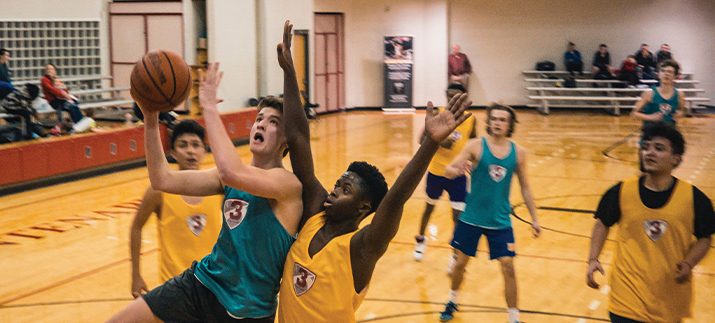
15 Feb The Dream Team
Current research shows that children and teens involved in athletics are more likely to cooperate well in group environments, perform well academically, feel a sense of purpose, and graduate high school. On the contrary, those not involved in athletics are more likely to struggle academically, present difficulty working in group environments, and try and/or become addicted to alcohol and drugs. Many residents at the Youth Opportunity Center have not had the opportunity to participate in athletic programs at their home school due to truancy, behavioral challenges or academic standing. Kendi Zvokel, our Recreation Coordinator, and her team of volunteer staff coaches are dedicated to changing that.
Over the course of the last 4 years, the YOC created basketball, soccer and football leagues for residents which has provided youth the opportunity to be a part of something bigger than themselves, a team. Each league is formally structured to include try-outs, drafts, practices and games. In addition to learning the rules of the game, players also learn how to contribute positively to a team and what it means to practice good sportsmanship. Participation on a league team not only leads to increased confidence and a sense of belonging but can also prove to be a normalizing activity for residents healing from trauma.
What makes these leagues unique? In order to play, residents must demonstrate good citizenship in their treatment program and progression in treatment goals, including positive behavior in school. In addition, kids rarely don’t make the team and are often given other ways to participate in the league. Because academic performance and continued therapeutic progress are requirements, participation on a team is often a motivator for continued success.
While the kids view the leagues as a way to play their favorite sport, the YOC staff know they are gaining so much more. We see our kids who have never played in a structured, team setting learn how to be positive teammates, compete appropriately, manage their emotions, and learn good sportsmanship skills. They learn how to work hard to improve their skills and learn to follow the directives of a coach. Our kids develop skills that will benefit them long past the end of the league in all areas of life. They gain new confidence and get to feel like a normal kid, while playing in front of their peers in their own jersey.
This story is from the Spring 2019 Newsletter. To view the full newsletter click here.


